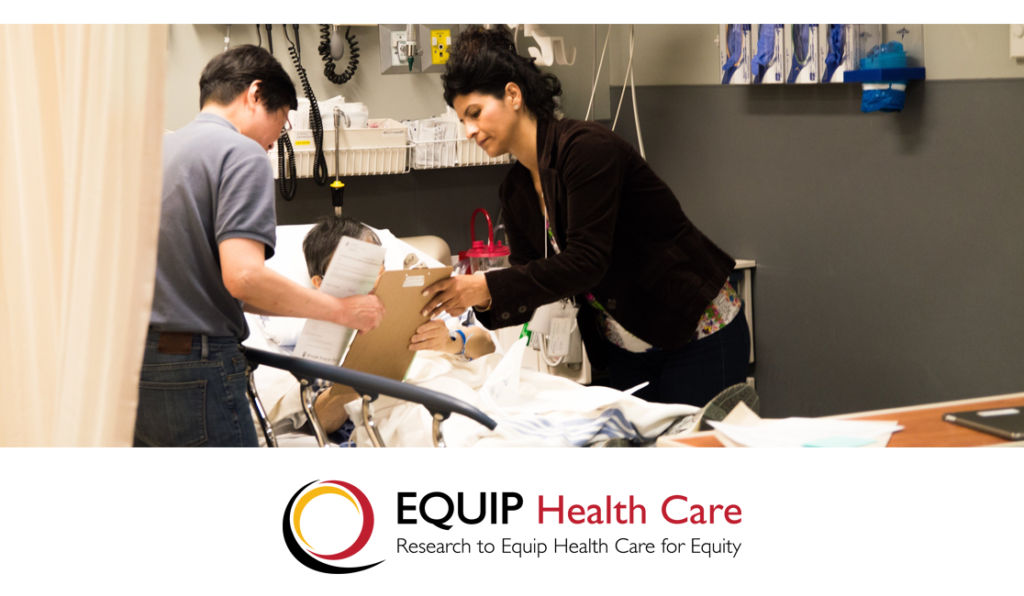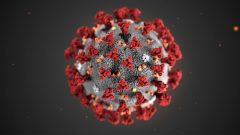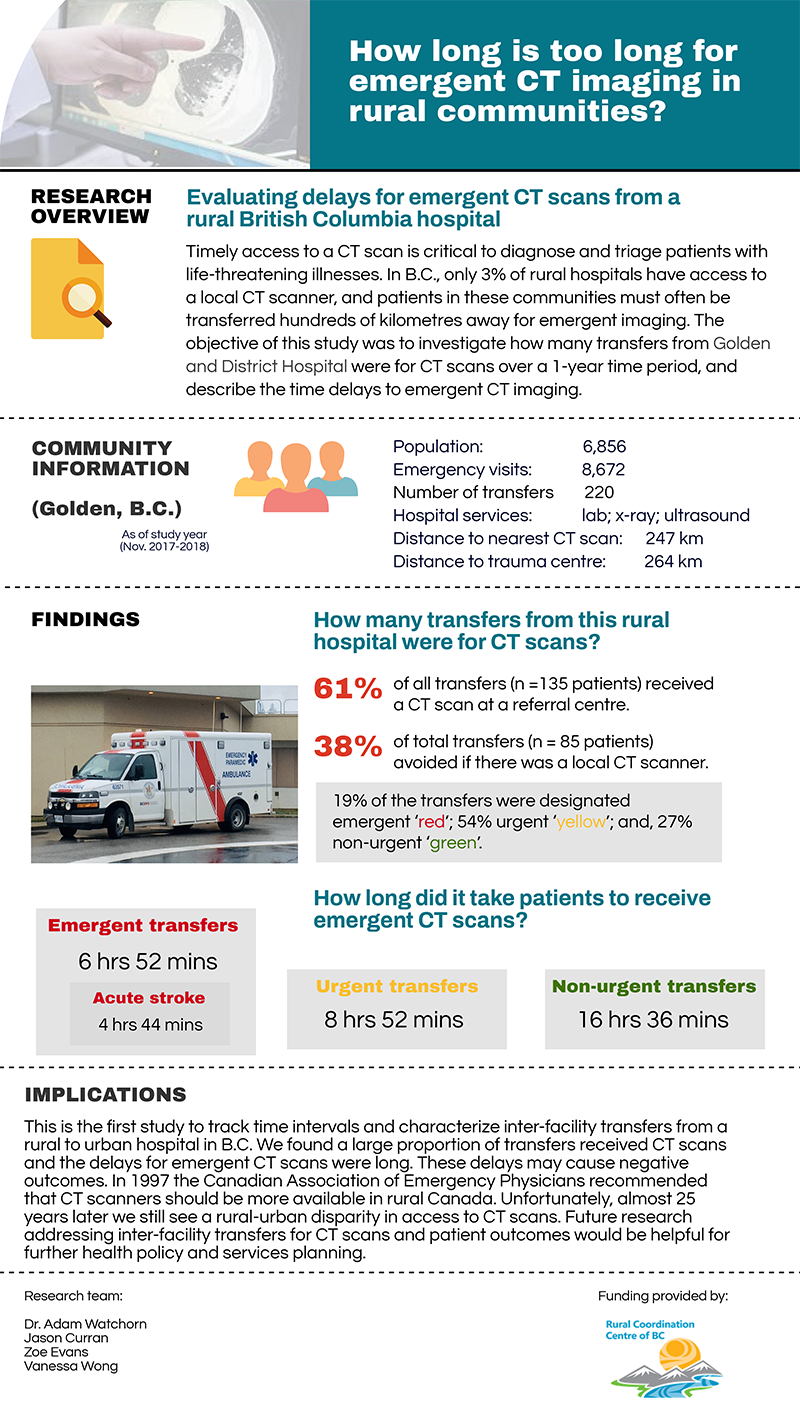Innovation Program
Browse research projects currently happening in BC led by ECBC members or in partnership with ECBC.
Other Noteworthy Research
A wide range of EM Research is carried out by ECBC members at various sites across BC. Please contact us if you’d like to see your research featured here.
FEATURED MEMBER RESEARCH
FEATURED MEMBER RESEARCH
EQUIP Emergency: Study Protocol for an Organizational Intervention to Promote Equity in Health Care
Emergency Departments (EDs) have the potential to mitigate health inequities people with complex health conditions, and the real-world application of this will be assessed in a new study, published in protocol form in the BMC Health Services Research Journal. The EQUIP study will examine the impacts of an organizational-level health equity intervention in emergency departments.
Practices of discrimination in the ED contribute to misdiagnoses, under-treatment, and errors, deter timely care, and increase conflict. The EQUIP study will apply a mixed methods process and outcome evaluation of ED provider improvement in the equity of care in emergency departments, particularly for groups known to be at risk for experiencing the negative impacts of health care inequities. These groups include Indigenous people, racialized newcomers, people with mental illnesses, people living in unstable housing or facing homelessness, people experiencing interpersonal violence or using substances, and people involved in sex work.
The study objectives are:
- Engage EDs in a participatory process to enhance capacity for Equity-Oriented Care (EOC)
- Examine the impacts of EOC initiatives on:
- Organizational policies and quality of care
- Patient experiences of care and selected outcomes
- Staff engagement and team effectiveness
- Analyze cost-effectiveness and scale-up potential
The intervention being assessed is a health equity-enhancing framework and includes implementable, measurable interventions, tested, refined and relevant to diverse EDs. Three BC ED’s will be participating in the study: St. Paul’s Hospital, Surrey Memorial Hospital, and the University Hospital of Northern BC.
View the study protocol here.
FEATURED MEMBER RESEARCH
FEATURED MEMBER RESEARCH
How Long is Too Long for Emergent CT Imaging in Rural Communities?
Timely access to a CT scan is critical to diagnose and triage patients with life-threatening illnesses. In BC, only 3% of rural hospitals have access to a local CT scanner, and patients in these communities must often be transferred hundreds of kilometres away for emergent imaging. The objective of this study was to investigate how many transfers from Golden and District Hospital were for CT scans over a 1-year time period, and describe the time delays to emergent CT imaging.
This study, led by member Adam Watchorn, highlights that the lack of a rural CT scanner is associated with increased transfers and significant time delays. Improving access to CT scanners for rural communities may be one of the many steps in addressing healthcare disparities between rural and urban communities.
FEATURED MEMBER RESEARCH
FEATURED MEMBER RESEARCH
Half of people with COVID-19 symptoms leaving emergency departments did not self-isolate as instructed

Almost half of people with COVID-19–like symptoms who were awaiting test results did not self-isolate as instructed.
“Despite a relatively strong understanding of self-isolation rules, we found that only 56% of patients discharged from Metro Vancouver emergency departments actually adhered to those rules,” said EM Network member and senior author Andrew Kestler. The study was published as a letter to the editor in the October 2021 issue of CJEM.
Dr. Lulu Yang, lead author and EM Network says the results show how challenging self-isolation can be even though it’s an important tool in controlling the pandemic.
“… self-isolation is difficult, and its success requires that individuals isolating have an established social support network and financial resources to meet their needs during the isolation period.” said Dr. Yang.
Study co-authors include EM Network members Devon Mitchell, Kerry Spearing, Gary Andolfatto, Eric Grafstein, Frank Scheuermeyer and Andrew Kestler. More information is available from the Centre for Health Evaluation and Outcome Sciences (CHÉOS).
EQUIP Emergency: Study Protocol for an Organizational Intervention to Promote Equity in Health Care
How Long is Too Long for Emergent CT Imaging in Rural Communities?
Half of people with COVID-19 symptoms leaving emergency departments did not self-isolate as instructed
If you have a research idea that will address a knowledge gap, please write to us about it.
Submit Your IdeaOpportunities to collaborate
Get involved! This section is for researchers looking for provincial collaborators. If postings are listed and you are interested and are a member please click on the member’s name to view their member profile and contact them directly. If you have opportunities to collaborate please click the Submit a Post below to have you post reviewed by ECBC and added here.
Impact of the COVID-19 pandemic on emergency physician work and well-being
You are being invited to participate in a research study on emergency physician workload, quarantine and COVID-19 infection during this pandemic. This is a weekly survey study. Your decision to participate is completely voluntary, and your job/professional standing will not be affected if you choose not to participate.
National registry of suspected and confirmed COVID cases
In response to the COVID crisis, ED physicians within BC and across Canada are collaborating to create a national registry of suspected and confirmed COVID cases in order to facilitate rapid research and response. Participation in the creation of this registry is crucial to enable the robust, high-quality data required to inform clinical best practice in an uncertain context. Please contact Corinne Hohl (corinne.hohl@ubc.ca) and/or Jeffrey Hau (jeffrey.hau@ubc.ca) for further information.
The Research and Innovation Program
The Innovation Program investigates and translates new knowledge in order to prevent health emergencies, improve clinical care, and optimize emergency systems. It’s also the means by which policy and process change are guided by evidence so that BC emergency departments are more conducive to safe and effective care. The Innovation Program supports EM clinician scientists and other clinicians with an appetite for research in prioritizing and developing solutions to relevant and important EM clinical problems. To ensure that the ECBC remains focused on optimal health outcomes for the citizens of BC, the Innovation Program encompasses patient-oriented research.


